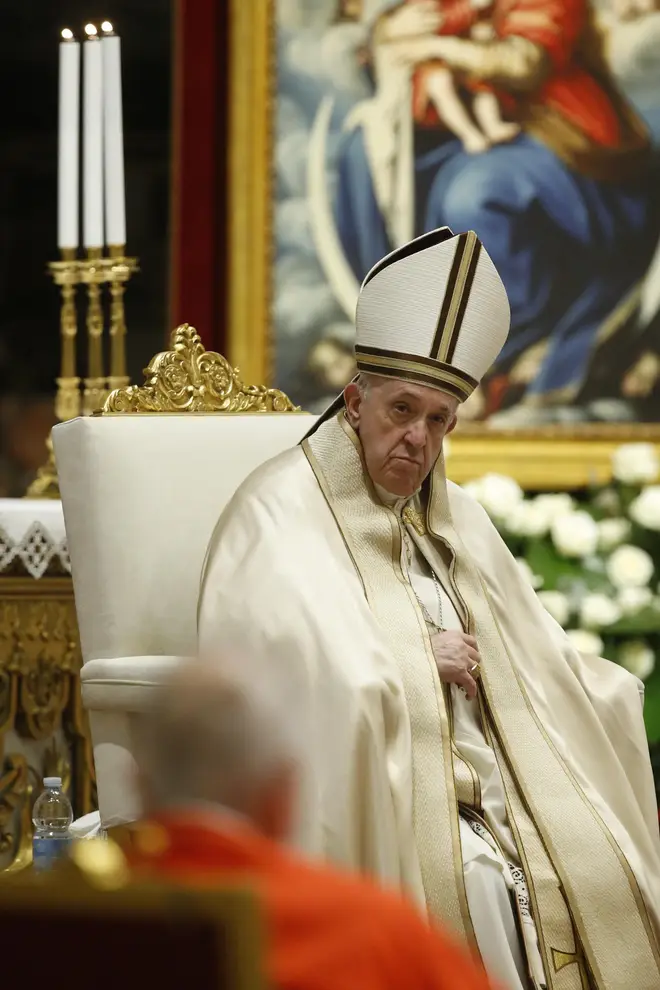
Nick Ferrari 7am - 10am
28 November 2020, 16:54

Francis warned the new cardinals against falling into corruption or using their new rank for personal advancement.
Pope Francis has raised 13 new cardinals to the highest rank in the Catholic hierarchy – and immediately warned them during a ceremony marked by the coronavirus pandemic not to use their titles for corrupt, personal gain.
Two new “princes” of the church, from Brunei and the Philippines, did not make it to Rome because of Covid-19 travel restrictions, and throughout a socially distanced ceremony, which clocked in at an unusually quick 45 minutes, cardinals new and old wore protective masks in a nearly empty St Peter’s Basilica.
Most of the cardinals removed their masks when they approached a maskless Francis to receive their red hats, but Cardinal Wilton Gregory, archbishop of Washington DC, kept his on.

During his homily, Francis warned the new cardinals against falling into corruption or using their new rank for personal advancement, saying their new title of “Eminence” does not mean they should drift from their people.
His comments reflected Francis’s constant complaint about the arrogance of the clerical class, as well as his battles to fight corruption in the Vatican hierarchy.
“Let’s think of so many types of corruption in the life of the priesthood,” he told the new cardinals, deviating from his prepared text.
The ceremony, known as a consistory, is the seventh of Francis’s pontificate and again reflected the Argentine’s effort to name cardinals from places that have never had them before or whose service to the church he wants to highlight.
Nine are under the age of 80 and eligible to vote in a conclave to elect a new pope, further solidifying the majority of Francis-appointed, voting-age prelates in the College of Cardinals.

Gregory, the new archbishop of Washington, is the Roman Catholic Church’s first African-American cardinal. He told the Associated Press ahead of the ceremony that he viewed his appointment as “an affirmation of black Catholics in the United States, the heritage of faith and fidelity that we represent”.
Gregory’s appointment comes after a year of racial protests in the US. Francis has endorsed the protests and cited the American history of racial injustices.
“There is awareness now of the need for racial reconciliation, an awareness that I have not seen at this level and at this intensity before,” Gregory said.
Another social justice-minded cardinal is the retired archbishop of Chiapas, Mexico, Cardinal Felipe Arizmendi Esquivel, who has championed the rights of Mexico’s indigenous peoples and spearheaded efforts to translate the Bible and liturgical texts into native languages.
Francis visited Chiapas in 2016 and has long championed the rights of indigenous peoples. “That could be one of the reasons (he made me a cardinal) but I can’t confirm it,” Mr Esquivel said.

The Vatican’s in-house theologian-preacher, Cardinal Raniero Cantalamessa, also got a red hat, but he successfully argued against being made a bishop as well, saying at his age — 86 — he could not take on the responsibility. He also eschewed a red cassock for Saturday’s ceremony, using instead his brown hooded friar’s robes covered with a white “rochet” vestment.
The ceremony took place against the backdrop of the Covid-19 pandemic, which erupted in Italy in February and has seen a resurgence this autumn. The Vatican is under a modified lockdown, with the Vatican Museums shuttered and Francis’s public general audiences cancelled.
The cardinal candidates and other who came to Rome from afar for Saturday’s service were required to undergo 10 days of Vatican-mandated quarantine at the pope’s hotel, where meals were brought to their rooms, video calls provided contact with the outside and the cardinals’ new red robes were hand-delivered by Rome’s famed ecclesial tailors.